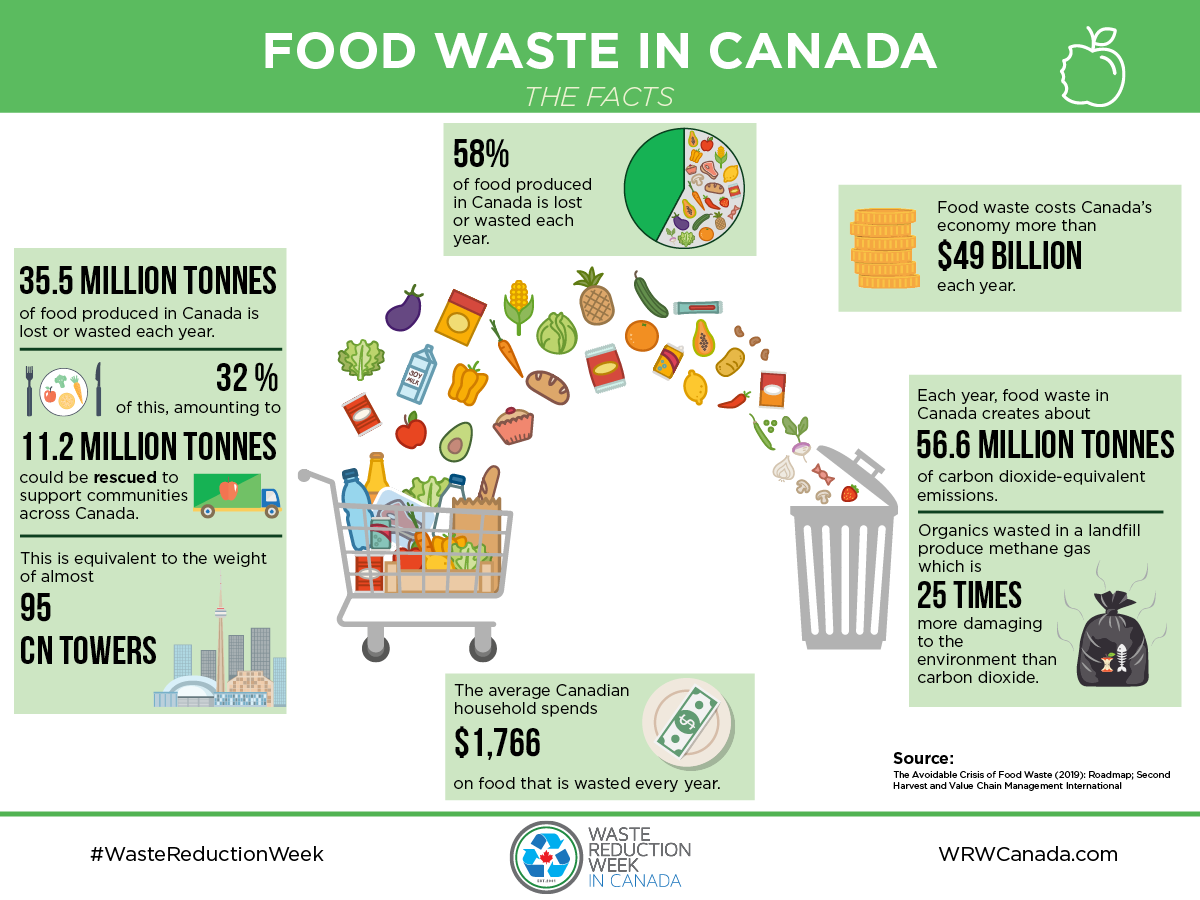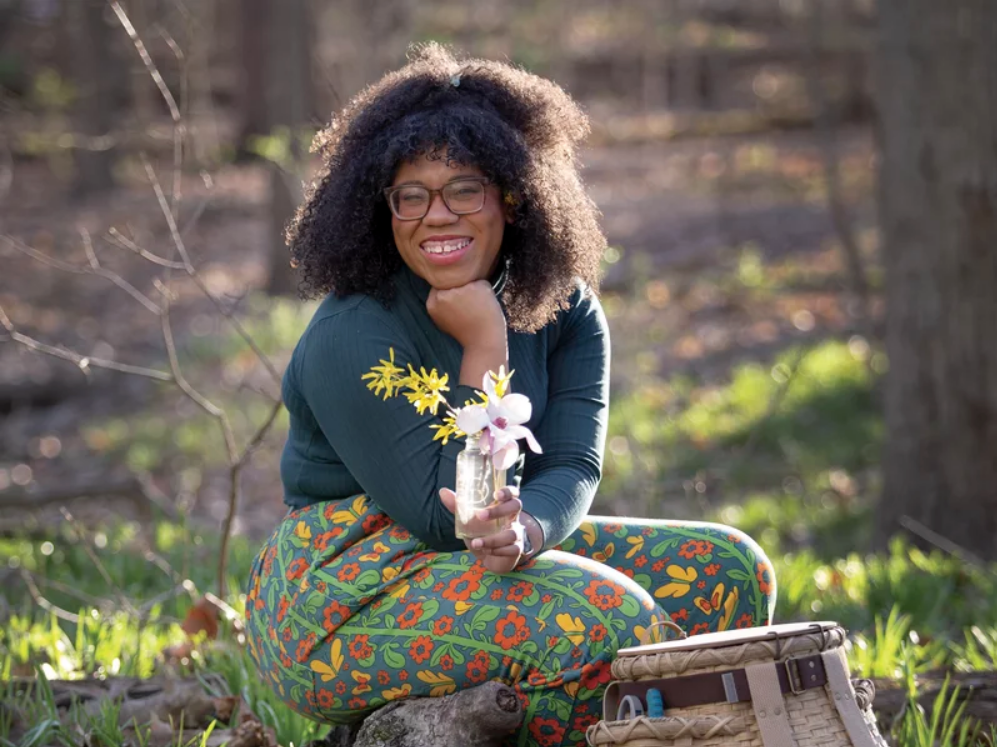Sustainable Foods Staff Selections 🎥📚🎧
Happy Summer! EcoSpark's summer multimedia list presents our favourite selections and helps you save money by living more sustainably!
Food prices are rising rapidly due to a combination of factors including: the worst drought in the Southwestern United States in 1,200 years (climate change), the war in the Ukraine, and the loss of farmland (Ontario loses over 300 acres of farmland everyday).
At EcoSpark we decided to look at what individuals can do to eat more sustainably and the number one thing to come up was to reduce the amount of food we waste!
Food Waste in Canada (Infographic)
Paul: To set the table, have a look at Waste Reduction Week Canada’s infographic showing how much food we waste and what it’s costing us. I’ve started by taking the Waste Reduction Week in Canada Food waste pledge. With my boys off at university, I’m on my own for the first time in decades, so I’m starting to relearn the basics with Love Food Hate Waste’s 10 easy tips - starting with how to make a meal plan before I go grocery shopping! I hope you will join me as I learn to eat healthier, live more sustainably, and reduce my costs by buying and wasting less food! Eat well, buy local, save money, and enjoy your summer.
Prodigal Summer (Fiction Book)
Dana: This novel by Barbara Kingsolver was my favourite book for the decade in which I studied environmental science/pollinators and worked on small organic farms! A moth researcher-turned farmer finds her footing with a tight-knit rural family; a park ranger finds her story in the wild; an aging orchardess sprouts romance amid the trees. The author weaves agro-ecological themes (such as predator-prey relationships and invasive species on farms) into compelling narratives of humans navigating our own species.
Alexis Nikole Nelson, The Wildly Popular 'Black Forager' (Social Media)
Sara: I'd like to use this NPR article to introduce one of my favourite nature-focused Instagram/TikTok accounts '@blackforager' aka Alexis Nikole Nelson. I first became intrigued by her posts when she showcased how to deal with Garlic Mustard (an invasive in Canada) by using it as a cooking ingredient. To me this was a genius idea! What better way to get rid of invasives, than to unleash humans to eat them? I soon discovered that Alexis doesn't just use her platforms to educate about the wonders of foraging, she also uses her passion as a way to "connect with African American and Indigenous food traditions that many people were discouraged — or actively prevented — from accessing." - an aspect of Western history I never knew about. I have been learning something new everyday!
How Radical Gardeners Took Back New York City (YouTube Video)
Emily A: Economic decline and the rise of nearby suburbia in New York City in the 60s and 70s left mass urban decay and mass disinvestment for many parts of the city - particularly, red-lined and low-income neighbourhoods. Community members such as Hattie Carthan and Liz Christy fought against this disinvestment from the city by turning abandoned spaces into community gardens and fought for more greenery in their neighbourhoods. Today, there are over 500 community gardens in the city thanks to their efforts.
abillion (App)
Alliza: Trying to eat less meat and more plant-based foods? abillion can help with that! abillion is a platform that connects people and helps them live, shop, and eat more sustainably. Through the app, you can discover the best vegan foods near you, review plant-based dishes and products, and explore content such as recipes and food guides (check out this vegan guide to Toronto!). The best part is that for each review you make, you gain a credit of US$1 which you can then donate to non-profit organizations working towards farm animal protection, food security, and nature conservation.
Put a Lid On It! (Cookbook)
Karen: Food preservation, including canning, freezing, drying and fermenting, can help us achieve some food sustainability goals. By preserving extra food before it spoils, we can decrease food waste. And by buying local food when it is in season and preserving it for consumption later in the year, we can reduce the number of out-of-season purchases we make. Put a Lid On It! is a "small-batch" canning book. You don't need a large canning kettle and a cupboard full of jars - just a stock pot and four or five canning jars will work for making a chutney out of your extra apples and berries. Or you can put up a few jars of chili sauce or tomato sauce when September arrives. By using your excess produce (before it needs to be tossed out), or making the most of Ontario produce when it is in season, we can reduce waste and support local growers.
Okja (Movie)
Livia: Sustainability sells, and the animal agriculture industry knows this. But does it come at a price? Directed by Bong Joon-ho, Okja is a film about a young girl and a genetically modified “super pig” named Okja, that she raises far away in the mountains of South Korea. But when a huge American corporation that owns the pig takes it away to the United States to be slaughtered, the young girl goes on a mission to rescue her beloved “Okja” from the cruel hands of the meat industry. Nominated for the prestigious Palme d’Or at the 2017 Cannes Film Festival, Okja is a film with a deep underlying message. It is a satire on corporate greed and a reflection of the world that we live in, woven through it all is a story of compassion, love and bond that at the end makes you question your morality and choices.
The New Farm: Our Ten Years on the Front Lines of the Good Food Revolution (Book)
Emily M: This book tells the story of a small sustainable farm in Creemore, ON. The farm’s co-owner, Brent Preston’s raw and witty writing style tells the story of life starting a farm and the harsh realities of the transition to farm life from downtown Toronto. After visiting the New Farm through a course to highlight the process of sustainable agriculture, I was inspired by hearing their story and commitment to not only ensuring their farm practices are sustainable, but their greater commitment to supporting sustainable food systems in southern Ontario.
How to Start a Regenerative Garden at Home (YouTube Video)
Matthew: This video is a quick guide to at-home gardening in a limited space that also includes an exploration of the benefits of regenerative agriculture for our food systems and our climate.









